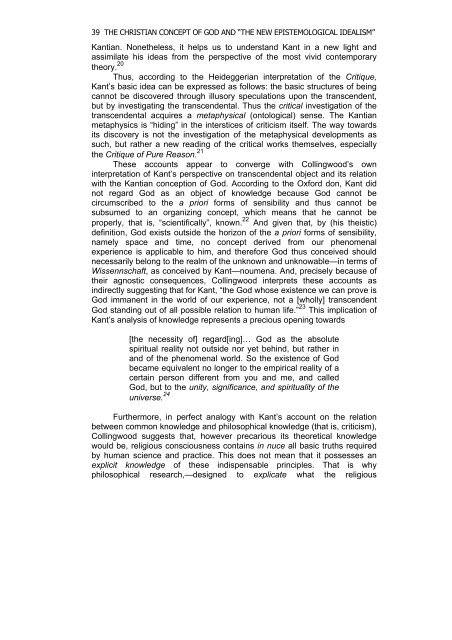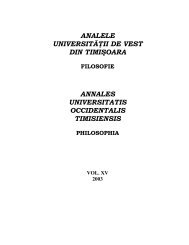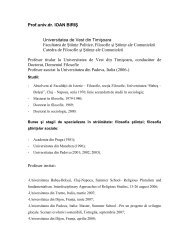VOL. IV (XXI) 2009 - Departamentul de Filosofie si Stiinte ale ...
VOL. IV (XXI) 2009 - Departamentul de Filosofie si Stiinte ale ...
VOL. IV (XXI) 2009 - Departamentul de Filosofie si Stiinte ale ...
Create successful ePaper yourself
Turn your PDF publications into a flip-book with our unique Google optimized e-Paper software.
39 THE CHRISTIAN CONCEPT OF GOD AND “THE NEW EPISTEMOLOGICAL IDEALISM”<br />
Kantian. Nonetheless, it helps us to un<strong>de</strong>rstand Kant in a new light and<br />
as<strong>si</strong>milate his i<strong>de</strong>as from the perspective of the most vivid contemporary<br />
theory. 20<br />
Thus, according to the Hei<strong>de</strong>ggerian interpretation of the Critique,<br />
Kant’s ba<strong>si</strong>c i<strong>de</strong>a can be expressed as follows: the ba<strong>si</strong>c structures of being<br />
cannot be discovered through illusory speculations upon the transcen<strong>de</strong>nt,<br />
but by investigating the transcen<strong>de</strong>ntal. Thus the critical investigation of the<br />
transcen<strong>de</strong>ntal acquires a metaphy<strong>si</strong>cal (ontological) sense. The Kantian<br />
metaphy<strong>si</strong>cs is “hiding” in the interstices of criticism itself. The way towards<br />
its discovery is not the investigation of the metaphy<strong>si</strong>cal <strong>de</strong>velopments as<br />
such, but rather a new reading of the critical works themselves, especially<br />
the Critique of Pure Reason. 21<br />
These accounts appear to converge with Collingwood’s own<br />
interpretation of Kant’s perspective on transcen<strong>de</strong>ntal object and its relation<br />
with the Kantian conception of God. According to the Oxford don, Kant did<br />
not regard God as an object of knowledge because God cannot be<br />
circumscribed to the a priori forms of sen<strong>si</strong>bility and thus cannot be<br />
subsumed to an organizing concept, which means that he cannot be<br />
properly, that is, “scientifically”, known. 22 And given that, by (his theistic)<br />
<strong>de</strong>finition, God exists out<strong>si</strong><strong>de</strong> the horizon of the a priori forms of sen<strong>si</strong>bility,<br />
namely space and time, no concept <strong>de</strong>rived from our phenomenal<br />
experience is applicable to him, and therefore God thus conceived should<br />
necessarily belong to the realm of the unknown and unknowable—in terms of<br />
Wissennschaft, as conceived by Kant—noumena. And, precisely because of<br />
their agnostic consequences, Collingwood interprets these accounts as<br />
indirectly suggesting that for Kant, “the God whose existence we can prove is<br />
God immanent in the world of our experience, not a [wholly] transcen<strong>de</strong>nt<br />
God standing out of all pos<strong>si</strong>ble relation to human life.” 23 This implication of<br />
Kant’s analy<strong>si</strong>s of knowledge represents a precious opening towards<br />
[the neces<strong>si</strong>ty of] regard[ing]… God as the absolute<br />
spiritual reality not out<strong>si</strong><strong>de</strong> nor yet behind, but rather in<br />
and of the phenomenal world. So the existence of God<br />
became equiv<strong>ale</strong>nt no longer to the empirical reality of a<br />
certain person different from you and me, and called<br />
God, but to the unity, <strong>si</strong>gnificance, and spirituality of the<br />
universe. 24<br />
Furthermore, in perfect analogy with Kant’s account on the relation<br />
between common knowledge and philosophical knowledge (that is, criticism),<br />
Collingwood suggests that, however precarious its theoretical knowledge<br />
would be, religious consciousness contains in nuce all ba<strong>si</strong>c truths required<br />
by human science and practice. This does not mean that it possesses an<br />
explicit knowledge of these indispensable principles. That is why<br />
philosophical research,—<strong>de</strong><strong>si</strong>gned to explicate what the religious




